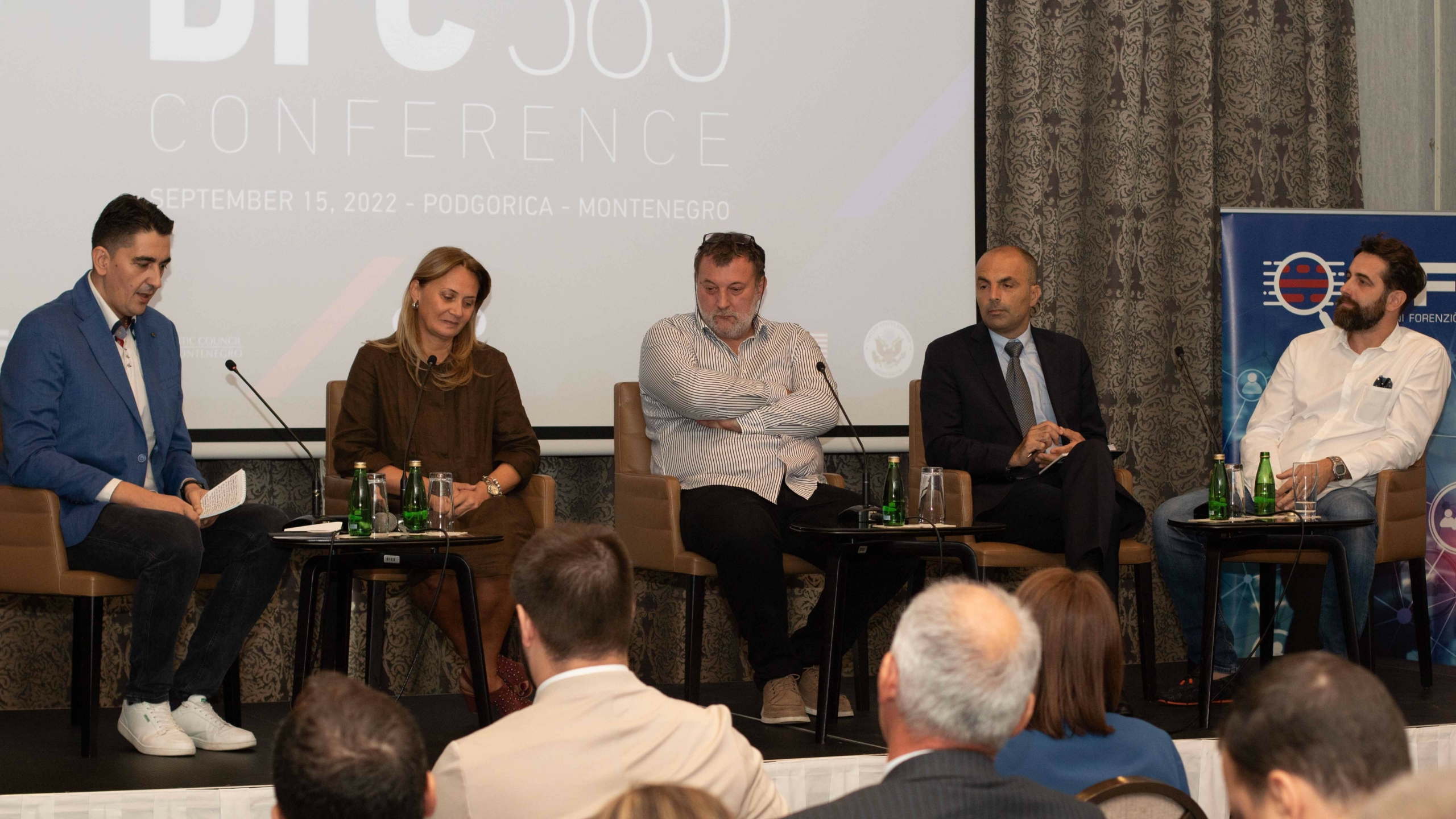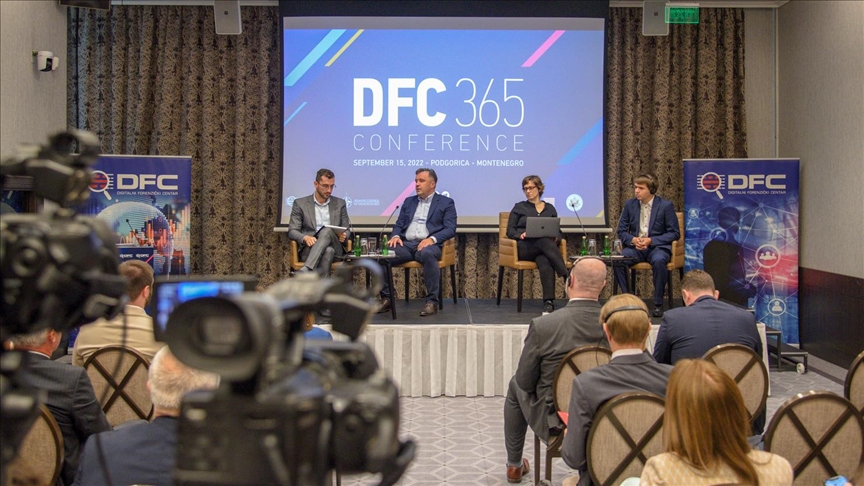In recent years, DFC has continuously warned about the alarming level of foreign malignant influence of Russia, and numerous analyzes clearly indicated Russian interference in Montenegro, which is primarily identified through the actions of Serbia and the Serbian Orthodox Church, said the executive director of the Atlantic Council of Montenegro, Azra Karastanović.
Opening the 4th annual DFC conference, she pointed out that at the time of the creation of the DFC, few understood what we were talking about and why establishing a center that fights against foreign malign influence and disinformation is necessary for a society like Montenegrin. She added that today, unfortunately, we are witnessing the disastrous consequences these and similar activities have on society, the institutions of the system, and the democratic progress of the state of Montenegro.
Karastanović said that if we want to eliminate malign foreign influence in this region, the support and help of Western and NATO partners is crucial; today, it seems more than ever.
“Unfortunately, if the West does not deal with issues that undermine the stability and European future of the countries of the Western Balkans, other parties will not miss the opportunity to do so,” she added.
The Atlantic Council of Montenegro executive director pointed out that in conditions of shaken trust in democratic processes and institutions, the fight for preserving pro-European and pro-Western values must be timeless and timely.
“That fight in Montenegro is being fought now”, concluded Karastanović.
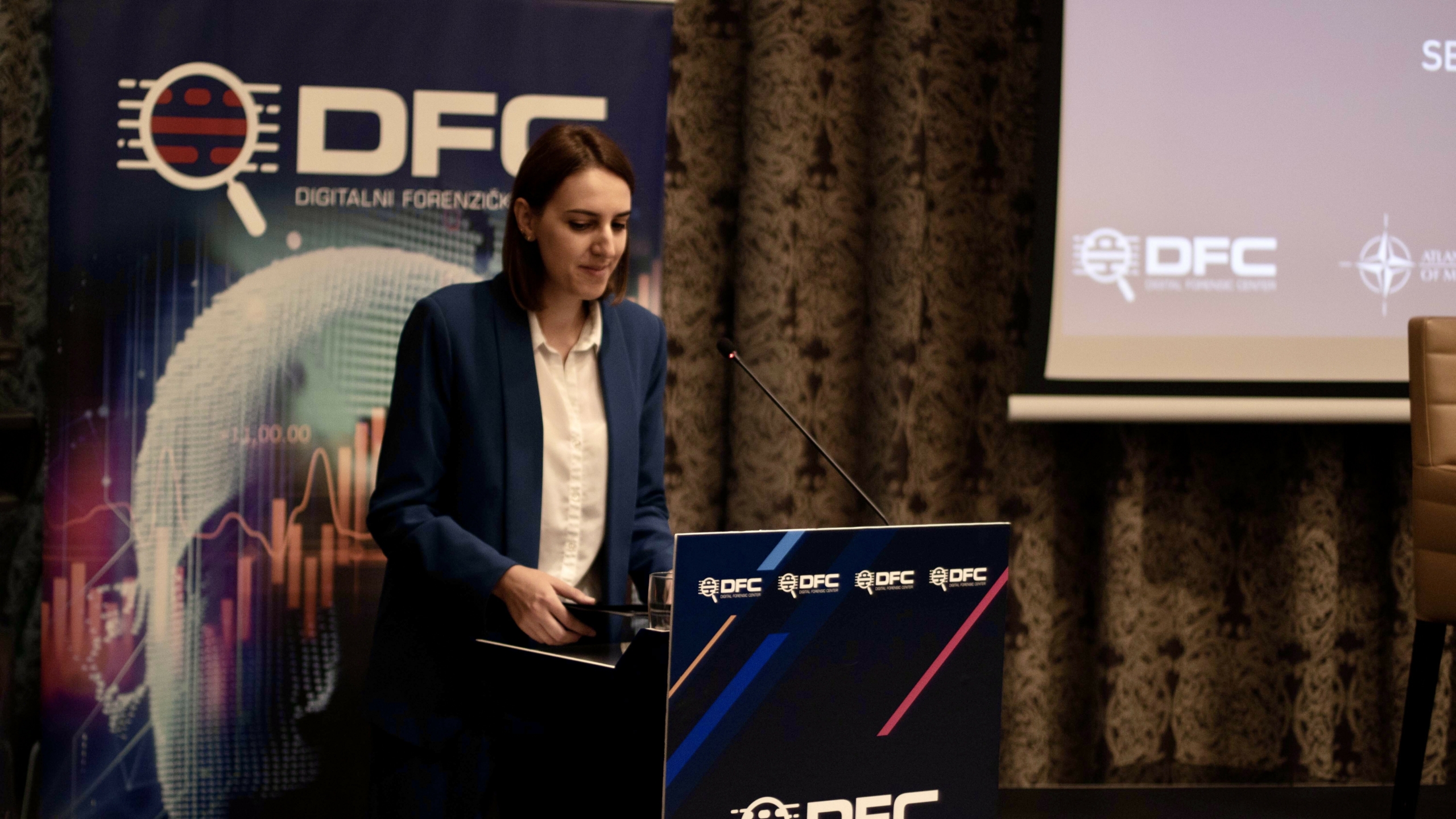
The importance of organizations like the Digital Forensic Center
A divided Montenegrin society is an excellent opportunity for actors who want to see Montenegro moving away from the Euro-Atlantic future, which is a widespread desire of many Montenegrin citizens, as well as a chance to disrupt those working to create a democratic and inclusive Montenegro, said the head of the department for media, culture, and education at the American Embassy in Podgorica, Eric Pugner.
At the opening of the Digital Forensic Center’s annual conference, he emphasized why it is so important to have organizations like DFC that monitor and point out disinformation and work to educate the public.
Speaking from personal experience, as someone who lived and worked in Moscow, he said that those surprised by Russian support for Putin’s war should know that it was preceded by years and years of spreading anti-Ukrainian disinformation. This is why education deserves additional emphasis, Pugner said, because we all know that just pointing out misinformation and inaccurate reporting does not undo the damage. Zbog toga obrazovanje zaslužuje dodatno isticanje, kazao je Pugner, jer svi mi znamo da samo ukazivanje na dezinformacije i netačno izvještavanje ne poništava štetu.
Also, he called for us to combine media literacy with the idea that truth is a social value, regardless of whether that truth fits comfortably into our worldview.
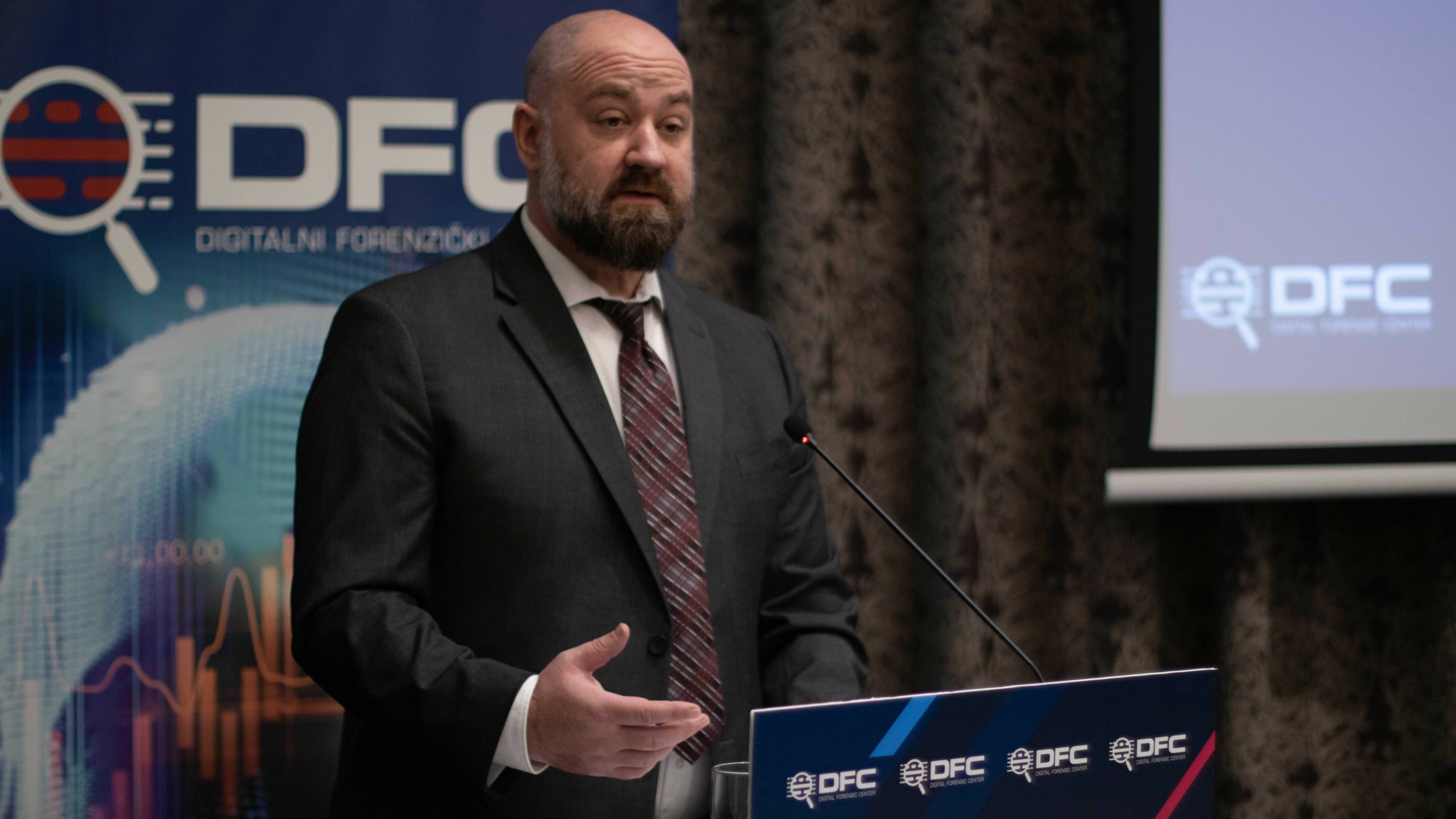
Disinformation and the Erosion of Democracy
Two panels were organized at today’s conference. The first panel was devoted to the fight against malign foreign influence.
Zlatko Vujović, president of the Management Board of the Center for Monitoring and Research (CEMI), speaking on the panel, said that there are many similarities between Ukraine and Montenegro, but also differences.
Ukraine and Montenegro are very similar in their problems. When we talk about the period before Russia attacked Ukraine, issues of an identity character, the absence of a single church at that time, divisions, the great influence of one of Russia’s neighbors in the case of Ukraine, Serbia in the case of Montenegro as well as a large number of pro-Russian media in Ukraine, both through the media whose headquarters were in Ukraine and the Russian media through cable operators, social networks, electronic publications, said Vujović. He pointed out that in the case of Montenegro, there is a vast amount of Serbian media penetration and a significant influence on political events in Montenegro. Vujović emphasized that there is a clear agenda according to which these media work.
He added that Russia does not have original resources in Montenegro but uses the strong branched infrastructure of Serbia, which consists of various parapolitical organizations, remnants of paramilitary formations, the Serbian Orthodox Church (SPC) with its system of various parareligious organizations, and the intelligence structures of Serbia.
In a dangerous combination, where there are para-religious and religious and intelligence structures and criminal structures, Montenegro risks permanently losing its pro-Western majority, Vujović emphasized.
Ana Rudan, program manager at the Center for Research, Transparency, and Accountability (CRTA), particularly emphasized the extent to which the government in Serbia has captured and keeps all segments of society under its control at every step. When it comes to the media, Rudan explained that there are two different ways in which the government controls the media, first based on ownership, through its own ownership or a clientelistic network, and then through financing.
The other side of the story is the media with national coverage, which are machines for spreading propaganda. In addition, she said that some smaller media are either too elitist or not invested enough in them.
Rudan emphasized that the problem in Serbia is not so much in tabloids because disinformation, fake news, decontextualization, and manipulation of content in Serbia are related to the mainstream. That is, tabloids are not alone in spreading such content. Her opinion is that the atmosphere in Serbia is anti-Western, that at this moment, Russia is recognized as someone who opposes the West, and that the media is not too active in promoting China.
Jindrich Privatsky, an analyst at the European Values Center for Security Policy from Prague, said that by making numerous reports, they recognized 45 active sites that spread misinformation, the main one being Sputnik, from which other media take over narratives and spread them further. Since 2020, covid has been a dominant topic. The media has spread misinformation about vaccines, that they are not effective and efficient, and that COVID is not real. However, in April of last year, it was discovered that Russian actors, and intelligence agents, were responsible for the Czech ammunition warehouse explosion in 2014. It only took a few hours after this was revealed for the media to turn the topic away from covid, which was absolutely dominant, and start investigating Russian involvement in this case. Although it usually takes several weeks for the media that spread disinformation to change the subject, in this case, it only took a few hours, Privatsky pointed out. The Russians knew about it, probably prepared the campaign, and coordinated with the biggest media.
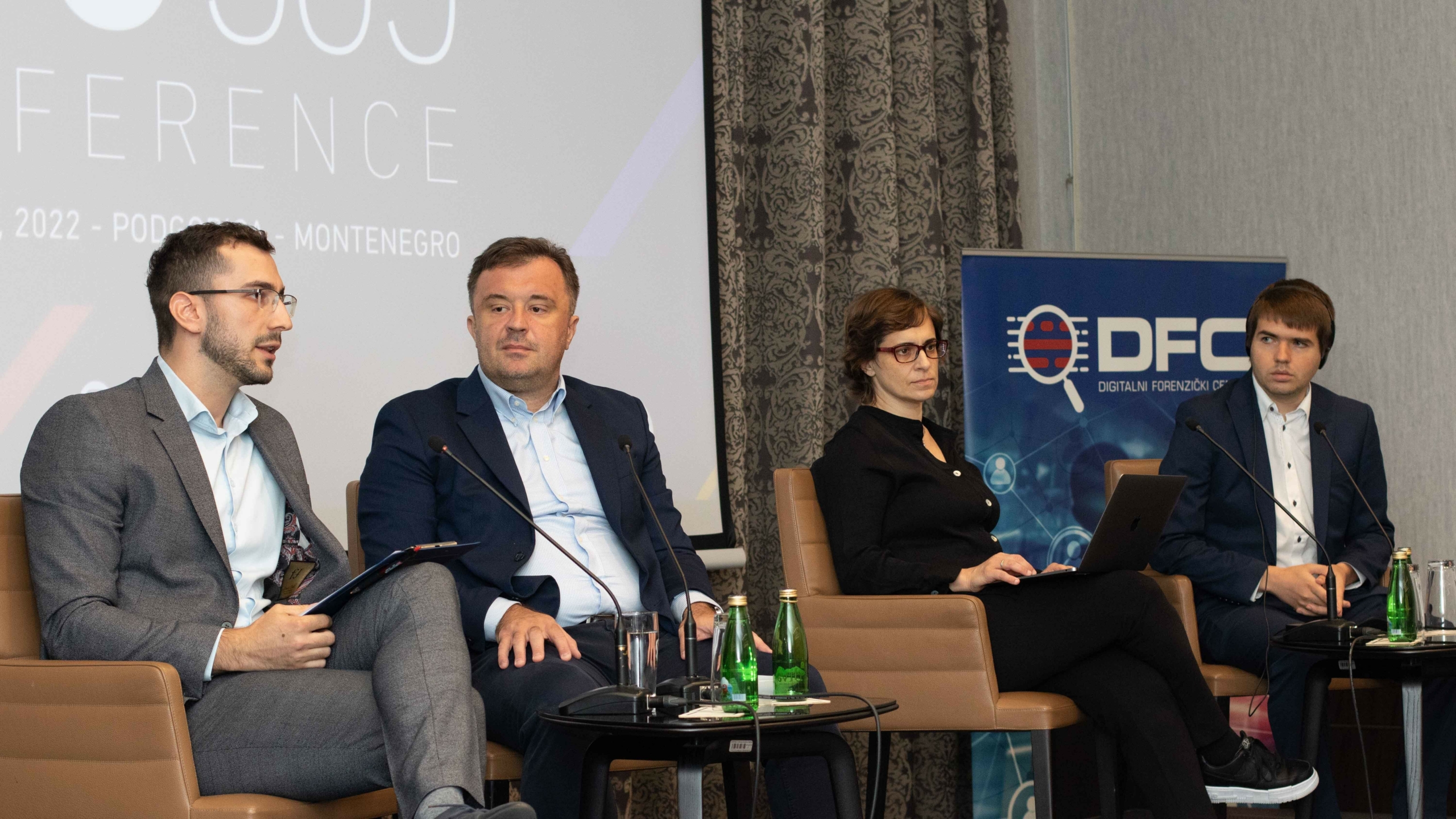
What path does the Montenegrin media tread?
At the second panel dedicated to the Montenegrin media, it was pointed out that the media in the country face significant problems in all spheres of media activity.
Sonja Drobac, director of TV E, Nikola Marković, director general of RTV Nikšić, Boris Raonic, director general of RTCG, and Boris Darmanović, editor-in-chief of CDM, participated in the panel.
In her presentation, Sonja Drobac pointed out that the Montenegrin media, police officers, and citizens have forgotten the importance and importance of media freedom, and what we live in today is high polarization, political bias, and a significant presence of media from the region.
Paradoxically, it is happening in the society where the first uncontrollably raised popular uprising in Europe, which concerned the protection of civil liberties, erupted, she added.
Drobac said that the solution to the problems faced by the media is itself and that the solution must come from the media. She concluded that the freedom of the media must be restored as an essential value because other civil liberties spring from that freedom.
Nikola Marković said that the media are the same as society. We have a problem that our political elites continuously do not understand the importance and essence of the media and do not create the environment and legal conditions for the media to be professional, he added. Marković pointed out that regardless of who is in power, in principle, everyone understands the media that they should not be the conscience of societies but the PR of particular political or interest groups. Markovć emphasized that the Montenegrin media scene is polluted, saying that today we are getting retrograde processes on the media scene since the past political elites allowed some media outlets to enter Montenegro without meeting the basic conditions, despite all laws. Marković concluded that the state must create a legislative framework in which domestic media can work and deal with unfair competition.
General Director of RTCG Boris Raonic said that the Public Service would soon start monitoring technological trends and developments. As a Public Service, we will offer help for OTT platforms in order to reach as many users as possible with content from Montenegro, he pointed out. Regarding national self-regulation, Raonic said that the Public Service is always ready to participate. What is equally important is the question of the national media strategy, that is, creating a new document that will include all the issues from the panel, concludes Raonic.
Raonic emphasized that we must have an organized legislative framework, saying that three governments have started this process, and none of them has completed the work.
He said we have a severe social problem that cannot be solved by the media alone. We have to see how to tax Netflix, how to make Disney invest in Montenegrin culture, and how to follow technological development, concluded Raonic.
The director of the CDM portal, Boris Darmanović, said that it is unfortunate that we have to fall into a severe media, political, and social crisis to discuss these topics.
Darmanović pointed out that he absolutely does not think that the problem of fake news can be solved by banning and punishing the media, adding that it can be a short-term, but by no means long-term, solution. He believes that the biggest problems in the media are lack of staff, lack of training, and financial issues in a tiny market, which leads to susceptibility to foreign influences because, for very little money, someone can influence the editorial policy of a media. In his view, the essence is to develop media literacy, train quality journalists, and foster critical awareness in public.
